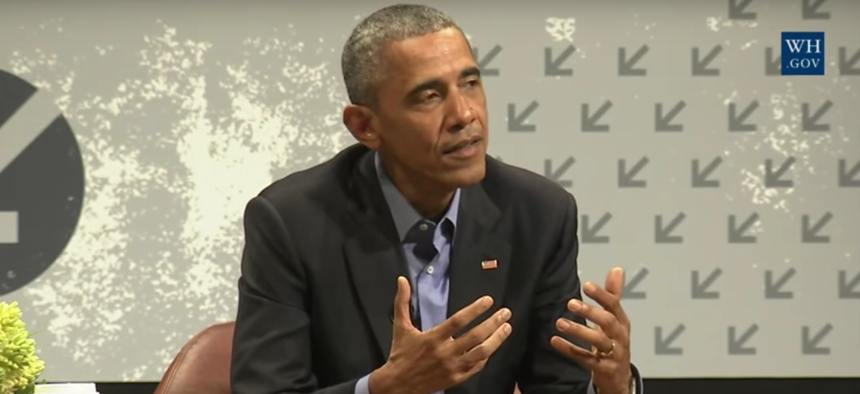
President Obama at the South by Southwest festival. White House
Obama Looks to Outsiders to Fix “Big and Bloated” Government
Citizens must step in to help agencies address key challenges, president says.
As his second term in office draws to a close, President Obama has surveyed the federal landscape and sees a government that is incapable on its own of addressing critical national problems.
So he’s making the case that outsiders--specifically, tech-savvy citizens--must step in and show federal agencies the way to a digital future.
During an appearance at the South by Southwest Music Film Interactive festival in Austin, Texas on Friday, Obama said, “part of my challenge since I’ve been president is trying to find ways in which our government can be a part of the positive change that’s taking place and can help convene and catalyze folks in the private sector and the nonprofit sector to be part of the broader civic community in tackling some of our biggest challenges.”
“Right now, with all the talent that’s out there, our government is not working and our politics isn’t working as well as it should,” Obama said. “The only way we’re going to solve that is make sure that we’re getting citizens involved in ways that we haven’t up until now.”
Describing “an example of the big and the bloated and the frustrated” in government, Obama said that as the “cool, early adapter” president, he was embarrassed by the failure of the launch of the Healthcare.gov website. As he has said in the past, Obama declared that the problem was that “the procurement systems, the specifications, the way that software was built in government was adapted for the age when procurement was for buying boots or buying pencils or buying furniture as opposed to buying software.”
The administration responded by creating the U.S. Digital Service at the White House, and encouraging technologists from outside government to come in for stints from six months to two years to take on specific projects. Those include revamping the federal student aid form, making it easier to apply for Social Security online and overhauling veterans’ services.
In the midst of his pitch for outsiders to help government, Obama also noted that federal agencies and employees often do not get credit for what they already do well.
“When government does great things, we take it for granted and it’s not a story,” he said. “I mean, every day, government is delivering for everybody in this room, whether you know it or not. I can find the fiercest libertarian in the room who despises every level of government, thinks it’s all corrupt, but they’re checking the weather on their phone, and lo and behold, it turns out that there’s a government satellite out there that is facilitating that.”
“Part of our task is to tell a better story about what government does,” Obama said. But he quickly added that “government is often its own worst enemy in the sense that it has to also be more responsive where people interact in a direct way with government.”
If as a citizen, your “primary interaction with government is the IRS, you just don’t have a good association with government when you’re writing that check,” the president said. “But if we make it easier, if it’s being done online, if suddenly, you have the capacity to interact with government in a way that also gives you some feedback about how your tax dollars are being spent or why this is important, or what you’re doing, so that it’s a two-way exchange as opposed to something that feels distant and that you have no control over, then people’s attitudes change.”
Obama acknowledged the difficulty of the challenges federal agencies routinely face. “Part of the reason that government doesn’t always appear to provide a satisfactory solution is because government has to take on the hardest problems,” he said. “The private sector doesn’t have to figure out how to educate the poorest kids. The private sector doesn’t have to figure out how to protect us from a terrorist cell. If you have aging, sick veterans, the private sector may not serve them as well, or to figure out how do we get homeless off the streets.”







